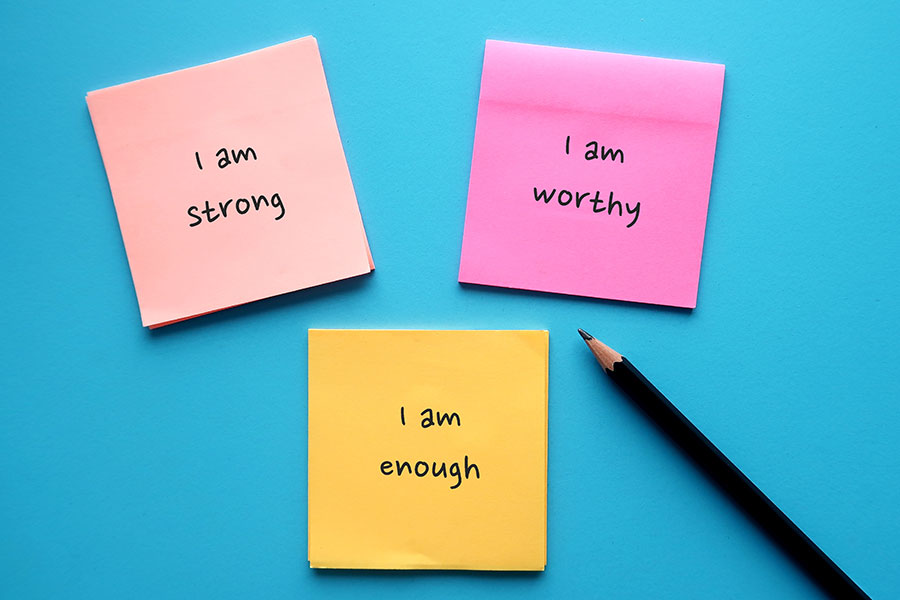A sceptic’s guide to affirmations

Affirmations often spark lively debate; some individuals swear by their positive vibes as essential tools for happiness and wellbeing, while others dismiss them as mere mindful mumbo-jumbo.
So, what exactly are affirmations, and how can they fit into our daily lives? Let’s delve deeper into this fascinating topic and explore how affirmations can enhance our mental and emotional well-being.
SO, WHAT ARE THEY?
“Affirmations are statements that cultivate or reinforce strengths, values, or actions we desire to manifest,” explains Suzy Reading, a chartered psychologist, yoga teacher, health coach, and author of The Self-Care Revolution. “The most powerful affirmations are personal, specific, framed positively, and expressed in the present tense.” This means that rather than saying, “I will be confident,” a more effective affirmation would be, “I am confident.” This subtle shift in wording can significantly impact how our minds perceive and internalise these statements.
At their core, affirmations are designed to help structure the mind during meditation, particularly for those who find it challenging to clear their thoughts. By focusing on positive affirmations, we can prevent our minds from wandering into negative territory. “Just as the eyes are designed to see, the mind is designed to think,” Suzy notes. “Instead of trying to clear the mind—a tall order even for seasoned meditators—it can be more beneficial to anchor it on constructive thoughts.” This approach not only makes meditation more accessible but also allows us to cultivate a more positive mindset.
Suzy emphasises the importance of using affirmations to harness the power of the mind. “They allow us to cultivate what we want rather than ruminate on what we don’t want. Having a set of affirmations to turn to can keep self-sabotaging thoughts and the inner critic at bay.” These affirmations can focus on a variety of aspects, from lifting our moods to tapping into qualities like compassion, kindness, curiosity, and gratitude—traits that can be especially helpful during times of stress and anxiety.
In a world where negativity can often feel overwhelming, affirmations serve as a beacon of hope and positivity. They remind us of our strengths and capabilities, encouraging us to embrace a more optimistic outlook on life.
HOW LONG HAVE THEY BEEN AROUND?
While affirmations have gained significant traction in recent years, particularly as Western culture embraces Eastern philosophies and lifestyles, their roots can be traced back to ancient practices like mantra. Mantras are sacred in nature, focusing on words, sounds, or invocations that develop concentration, deepen meditation, and facilitate a connection with a higher power. In contrast, affirmations are more motivational and accessible, making them suitable for anyone looking to improve their mental well-being.
The modern concept of affirmations was popularised by Louise Hay in her groundbreaking book You Can Heal Your Life (1984) and later by Rhonda Byrne in The Secret (2006). These works introduced the idea that our thoughts and beliefs can shape our reality, encouraging countless individuals to explore the transformative power of positive thinking. They are also linked to the rise of neurolinguistic programming (NLP), which explores the connection between neurological processes, language, and behavioural patterns.
As we continue to navigate the complexities of modern life, the appeal of affirmations remains strong. They offer a simple yet effective way to shift our mindset and foster a sense of empowerment.
HOW CAN PEOPLE PRACTICE AFFIRMATIONS IN THEIR DAY-TO-DAY?
Incorporating affirmations into your daily routine is easier than you might think! They can be repeated to oneself, either out loud or silently, or even written down for added impact. “Like any self-care practice,” Suzy advises, “they need to be tailored to the preferences and circumstances of the individual. They can be done anywhere, anytime. Whenever you want to connect with something personally galvanising, turn to affirmation.”
Suzy shares her personal approach: “I particularly like to use them at the beginning of my day to set the scene. I use them throughout my day to focus and self-soothe. I also use them at the end of the day to disentangle from busyness and pave the way for sleep.” This routine not only helps to centre her thoughts but also creates a sense of continuity and purpose throughout her day.
To enhance the experience, she recommends pairing affirmations with other sensory elements. For instance, you might create a complementary ritual that includes an affirmation, a soothing scent (like a calming room spray), a breathing technique, and a mindful posture. Engaging multiple senses can deepen the impact of your affirmations, making them more memorable and effective.
HOW DO YOU KNOW WHAT TO SAY?
If you’re wondering how to craft your own affirmations, Suzy suggests starting with a simple question: “How do you want to feel?” Frame your affirmation around what you want to cultivate, and repeat it or write it down with intention. To deepen the experience, consider incorporating movement. For example:
– Yoga mountain breaths with “I am ready.”
– Yoga warrior lunge with “I am resilient.”
– Child’s pose with “I soften into this moment.”
You might also choose affirmations like “I am whole and perfect the way I am,” or “I am calm/resilient/courageous/resolute/strong/patient/resourceful.”
Ultimately, Suzy emphasises the power of simplicity: “When my monkey mind wants to counter my affirmations, I revert to a simple ‘I AM.’ That fact is irrefutable.” This straightforward approach can be incredibly grounding, reminding us of our inherent worth and potential.
So, whether you’re a seasoned affirmation enthusiast or just dipping your toes into this practice, remember that the journey is personal. Embrace the power of your words, and let them guide you toward a more positive and fulfilling life! By integrating affirmations into your daily routine, you can cultivate a mindset that not only enhances your well-being but also empowers you to navigate life’s challenges with grace and resilience.
In a world that often feels chaotic, affirmations can serve as a gentle reminder of our strength and capacity for growth. So why not give them a try? You might just find that a few positive words can make a world of difference!








